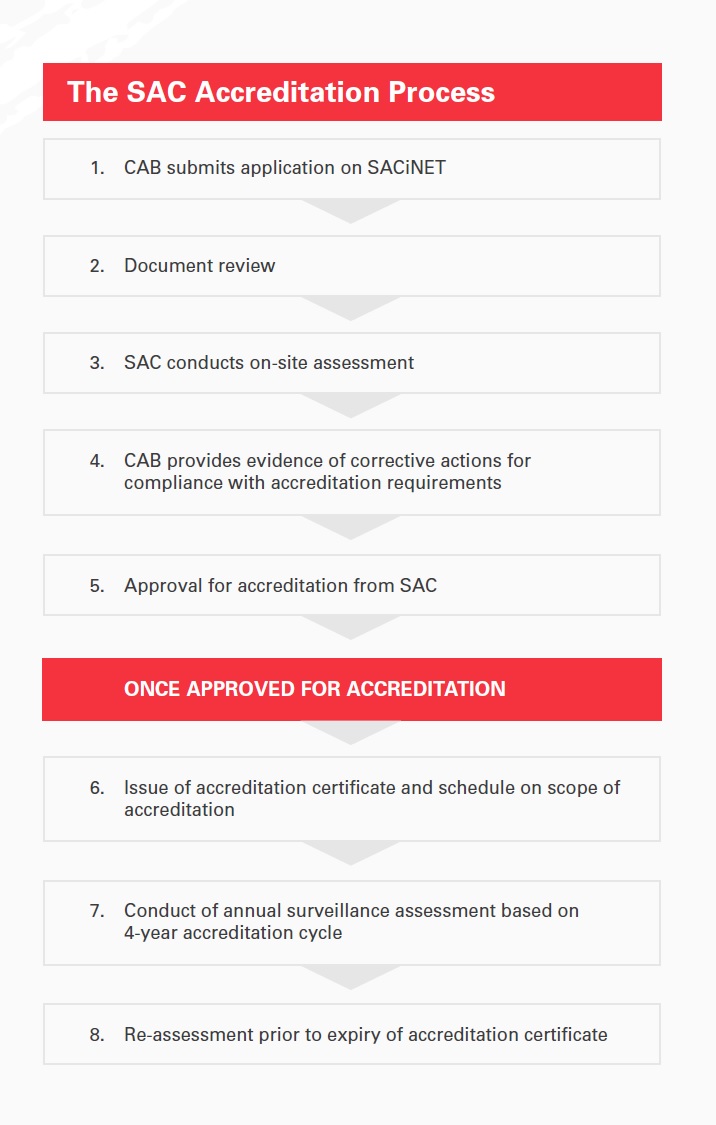Management System Certification Bodies
About
Accreditation is an endorsement of a certification body’s independence, integrity and technical competence. Most importantly, accreditation provides a certification body with a trust mark and confidence to offer its services nationally and globally.
About the Scheme
The Accreditation Scheme for Quality Management System Certification Bodies was launched in October 1996 to maintain the standard of certification activities in Singapore. Since then, there are other related programmes launched such as the Accreditation programmes for:
- Anti-Bribery Management System
- Asset Management System
- Business Continuity Management System
- Cold Chain Management of Chilled and Frozen Foods
- End-of-Life ICT Equipment Management System
- Energy Management System
- Environmental Management System
- Food Safety Management System
- Good Distribution Practice for Medical Devices
- Hazard Analysis Critical Control Point-based Food Management System
- Information Security Management System (including Privacy Information Management System)
- Learning Service Providers
- Medical Device Quality Management System
- Multi-Tiered Cloud Computing Security Management System
- Occupational Health & Safety Management System
- Quality Management System (including Quality Management for Bunker Supply Chain)
- Water Efficiency Management System
The scheme was extended in August 2003 to cover the certification of bunker suppliers, in a show of support for the Maritime and Port Authority of Singapore’s initiative to highlight Singapore’s status as a bunkering hub. In April 2008, the scheme was further extended to cover the certification of good distribution practice of medical devices (GDPMDS). This was an effort to support the Health Sciences Authority’s initiative to ensure the quality and integrity of medical devices throughout the distribution process.
The Accreditation Scheme for Environmental Management System Certification Bodies was launched in November 1999.
In July 2005, the Accreditation Scheme for Occupational Safety and Health (OSH) Management System was launched, followed by the Accreditation Scheme for HACCP based Food Management System in September 2005. The accreditation scheme for food safety management system (ISO 22000) was launched in October 2006 while the accreditation scheme for business continuity management (BCM) was launched in April 2010.
 Accreditation Scheme for Food Safety Management System
Accreditation Scheme for Food Safety Management System
The accreditation programme for Energy Management System was launched in July 2012, followed by the Water Efficiency Management System in June 2013. These programmes support the increasing demand and need to optimise our limited resources and the “green” movement.
In 2014, SAC launched the accreditation programmes for Learning Services Providers, Multi-Tiered Cloud Computing Security and End-of-Life ICT Equipment. The accreditation programme for Asset Management was launched in 2015. The accreditation programmes for Medical Device-Quality Management System and Anti-bribery Management System Certification were launched in 2017. In 2021, the accreditation programmes for Cold Chain Management of Chilled and Frozen Foods were launched
Accreditation Criteria
SAC accredits certification bodies that can demonstrate compliance with the requirements and scope stated in SAC CT 01.
Benefits
Accreditation will:
-
Increase confidence:
Widely recognised by regulators and the industry, SAC accredited certificates instil greater confidence in those who choose to engage the services of SAC accredited certification bodies. -
International recognition:
As a member of the Multilateral Recognition Arrangement (MLA) for Quality Management System of both the Asia Pacific Accreditation Cooperation (APAC) and the International Accreditation Forum (IAF), certificates issued by SAC accredited certification bodies are recognised worldwide by MLA members across more than 50 economies.
Process
Upon receiving the application for accreditation, qualified assessors are assigned to assess the system of operations of the certification body and the competence of the auditors. This will be carried out through a document review, assessments at the certification body’s office as well as on-site witnessed assessments of audits – all conducted by the certification body. When the certification body has demonstrated compliance with our requirements, it will be recommended for accreditation. Once approved, SAC will grant a certificate of accreditation. The detailed description of the type of assessment is stipulated in CT 01, Accreditation Process.
The detailed description of the accreditation process can be seen below:

Upon fulfilling the basic requirements, the CAB can apply online through the SACINET website.

